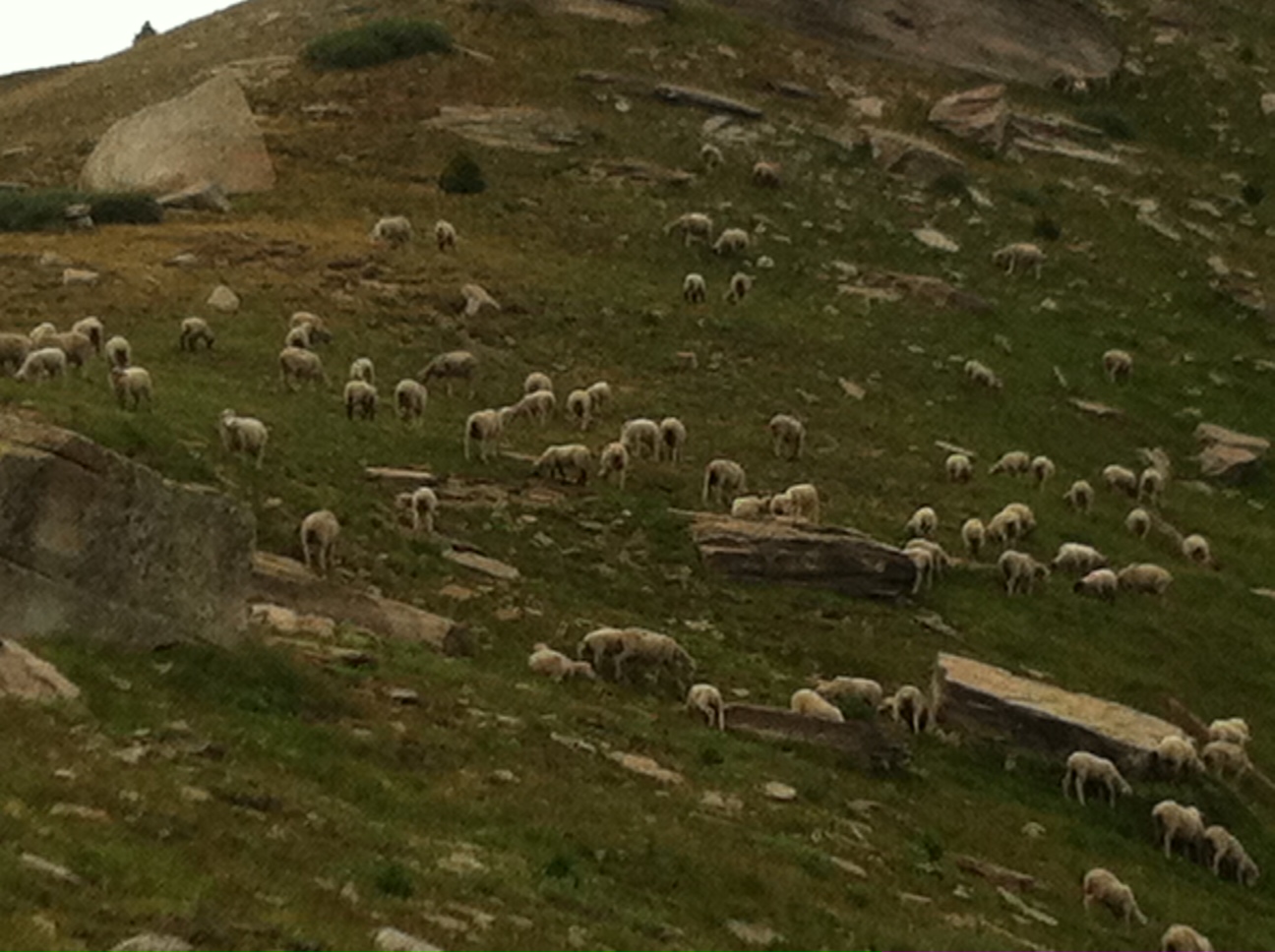Listen to the sermon with the player below, or, download the audio.
+ + + In Nomine Jesu + + +
Please join me in prayer: May the words of my mouth and the meditations of our hearts be pleasing in your sight, O Lord, our Rock and our Redeemer. Amen.
Dear Brothers and Sisters in Christ,
Grace to you and peace from God our Father and from the Lord Jesus Christ.
Nearly one year ago I came up from Austin to provide Pilgrim what is called “pulpit supply”. The Gospel Reading that day, although from St. Matthew’s divinely‑inspired account, was, like the Gospel Reading today, about Jesus’s miraculously feeding more than 5‑thousand people. Nearly one year ago I began my sermon by mentioning treats donated to newsrooms where I had previously worked, and I titled (or themed) that sermon “Free Food”. Today I have titled (or themed) this sermon “Free Lunch” and so begin by talking about free lunch.
Starting in the mid‑1800s in this country, one reportedly could easily find a free lunch. These free lunches were not served by charities to the poor and hungry or by schools to impoverished children, but these free lunches were served by certain saloons to anyone who bought an alcoholic drink. Of course, such lunches were never really “free”, since saloons simply included the cost of the lunch in the price of the drinks the customers had to buy. And, since customers could not have the “free” lunch without first paying money to the saloon, some saloons were sued for false advertising, which suits apparently contributed to the decline of the free lunch. Decades later, U‑S Vice President Henry Wallace suggested that after World War Two there should be worldwide minimum standards for food. And, in an editorial referring to Wallace’s suggestion, The Long Beach Independent apparently gave us the first recorded use of the statement “there is no such thing as a free lunch”. Yet, a free lunch is exactly what the people of today’s Gospel Reading got.
Today’s Gospel Reading again picks up St. Mark’s divinely‑inspired account where last week’s Gospel Reading left off. But, since last week’s Reading about Herod Antipas beheading John the Baptizer was a bit of a digression from the main narrative, today’s Reading really connects more directly with the Gospel Reading from two Sundays ago. Then, we heard how the Twelve, whom Jesus sent two by two, went out and proclaimed that people should repent, cast out many demons, and anointed with oil many who were sick and healed them. Today, we heard how the apostles returned to Jesus and told Him all that they had done and taught. Since people were coming and going so much that Jesus and His disciples again did not have an opportunity to eat, they tried to get away by boat to a desolate place to rest. But many saw them going, understood what they were doing, and ran the ten miles or so there on foot from all the towns and got there ahead of them. When Jesus went ashore, He saw a great crowd, had compassion on them, and began to teach them many things, until it grew late, and His disciples told Him to send the people away so that the people themselves could buy something to eat. Jesus in turn told His disciples to give the people something to eat, but, like Moses with God in the wilderness, His disciples thought Jesus meant that they should buy a substantial value of bread. For all the miracles they had previously witnessed and for all their success on their mission trip, Jesus’s disciples still did not quite understand Who Jesus was and what He could do; they did not imagine the “free lunch” He could provide.
Are you and I any better than the disciples? Do we understand Who Jesus is and what He can do? Do we imagine the “free lunch” He can provide? When we are threatened by our problems and overwhelmed by our needs, do we first turn to the Lord? Or, do we think that we have to solve our problems and meet our needs completely on our own? In economic theory, there is no such thing as a free lunch—that is, one cannot get something for nothing. Do we think the same way about God—that we somehow have to buy or earn what He wants to give us for nothing? Do we even over-rate our own capabilities, thinking in some way we can please or impress God?
By nature, you and I are sinners through and through. By nature, we are no better than the disciples. Too often we do not first turn to the Lord when threatened by our problems and overwhelmed by our needs. Too often we think we do have to solve our problems and meet our needs completely on our own. Too often we think we somehow have to buy or earn what God wants to give us for nothing. Even if we do not sin in those ways, we sin in countless others. So deep is our corruption that, worst of all, we are by nature alienated from God and can do nothing about it. Yet, God does not leave us in that condition. As Jesus called the disciples to come away and to rest, so God calls you and me to repent. God calls us to turn in sorrow from our sin, to trust Him to forgive our sin, and to want to do better. When we so repent, then God forgives our sin, whatever it might be. God forgives our sin freely, for the sake of His Son, Jesus Christ. If forgiveness in some sense is our “free lunch”, then it is only free because Jesus paid the price.
The Gospel Reading tells us that the great crowd moved Jesus to compassion. The Greek word for that “compassion” suggests it was a gut‑wrenching experience, as the guts were thought to be the seat of love and compassion. Jesus acted on that compassion by teaching the great crowd many things. You and I also have moved Jesus to that same compassion, and He has acted on that same compassion by dying on the cross for you and for me. As prophesied in the Old Testament Reading, Jesus is the righteous Branch, Who reigns as king and deals wisely, who executes justice and righteousness in the land, Who saves Judah, and Who makes Israel to dwell securely. In Jesus, the Lord is our righteousness. As St. Paul put it in today’s Epistle Reading, Jesus is our peace. He has reconciled us to God through the cross. Through Him we have access to the Father by the Spirit. For, the Spirit creates faith in us to receive the forgiveness of sins as a sort of “free lunch”. When we turn from our sin in sorrow and believe Jesus died for us, then God forgives our sin and our sinful natures themselves. He restores our souls to a right relationship with Him—that is how great God’s compassion is for us in Jesus Christ.
My sister and most of her family are out at their home in the Rocky Mountains right now. The other day, they and some of their Austin friends hiked up Ptarmigan Pass, which is west of where they live in Frisco, before one gets to Vail. From their hike, she emailed me two pictures of a huge flock of sheep on a mountainside. In one picture was a black sheep; I am not exactly sure what kind of subtle (or not‑so‑subtle) message she was trying to send me with that picture. But I noticed that in both of the pictures the sheep were without a shepherd! (Though no shepherds were pictured, my sister tells me that there actually are shepherds who lease the grazing rights of the national forest land in order to fatten their domesticated sheep.) In the Gospel Reading, St. Mark uniquely tells us that part of what motivated Jesus’s compassion on the great crowd was that they were like sheep without a shepherd. Or, at least they were like sheep without the Good Shepherd, since the spiritual leaders they had were like those God described through Jeremiah in the Old Testament Reading, destroying, scattering, and otherwise not attending to God’s flock. Jesus the Good Shepherd gathers the remnant of His flock, brings them back to their fold, and cares for them. Having first taught them many things, He next acts on His compassion by making them to sit down on green grass and preparing their food before them.
Back when Vice President Henry Wallace was prompting all that talk about free lunches, Washington journalist Paul Mallon, in a piece published in newspapers across the country, reportedly wrote that “Until man acquires the power of creation, someone will always have to pay for a free lunch.” Perhaps Mr. Mallon overlooked the miracle of today’s Gospel Reading! The God-man Jesus began by borrowing five loaves of bread and two dried or roasted fish, but His power of creation soon multiplied that food so that 5‑thousand men—not to mention women and children, more than the population of the nearby towns—were not just fed but were satisfied. This lunch really was free; the twelve baskets full of what was left would have been more than enough to return the food with which Jesus began. Today, Jesus uses that same power of creation for us.
Having heard Jesus’s Word, you and I come forward to be fed. Made new as God’s children in Holy Baptism and forgiven in Individual Absolution, we lift up our hearts and come here, to this altar rail. Here, we receive, what we in Vacation Bible School this week called, “provisions for the journey”. Here, we sinners have table fellowship with our Lord. Here, in some sense of the words our Introit quoted from Psalm 145 as the Small Catechism does for its table prayer, He opens His hand and satisfies the desire of every living thing. Here, in the words of our Hymn of the Day, the Church partakes one holy food. For, here, He miraculously is really, physically present with His body and blood in, with, and under bread and wine, multiplied to every such gathering of believers of every time and place, for the forgiveness of sins, life, and salvation. Here, in the words of our first Distribution Hymn, our Bread of Heaven, our Soul’s Delight, feeds us with His own, wounded hand. Here, in the words of our Closing Hymn, The King of Love feeds us with celestial food.
We recognize the value of what is here, we make time to receive it, and we tell others so that they also hunger and thirst for it. What we receive here transforms us. Through Christ’s body and blood, the Holy Spirit builds us together into a dwelling place for God, what the Epistle Reading also called a holy temple in the Lord. Even though in this lifetime we do not appear, either to ourselves or to others, to be holy, we daily live in the forgiveness of sins, covered with Christ’s righteousness so that God sees us as holy. As today’s Collect says, we do not deserve His goodness, but out of His compassion He still provides us, as a sort of “free lunch”, all our needs of body and soul. For such benefits, we thank Him now, as we will one day thank Him in eternity.
Amen.
The peace of God, which passes all understanding, keep your hearts and minds in Christ Jesus. Amen.
+ + + Soli Deo Gloria + + +

